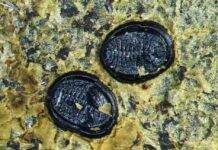
A study, carried out by Professor Andrew C. Scott of the Department of Earth Sciences at Royal Holloway, University of London and Professor Sue Rimmer from Southern Illinois University, reveals widespread fire occurred on Earth more than 80 million years after plants first invaded the land.
The findings, published in the American Journal of Science, indicate that although plants were first detected on land more than 440 million years ago there is only scant evidence of fire at that time.
Professor Scott, said: “What surprised us was that many of these early extensive fires were surface fires burning the undergrowth, as we can see the anatomy of the plants being burned through scanning electron microscope studies of larger pieces of the fossil charcoal.”
He added: “This may be because plants were small and were limited in their distribution but over the following 50 million years they diversified and spread across the globe and some of the plants were trees and could have provided a good fuel to burn. Extensive forest fires soon followed, however and we see widespread charcoal deposits throughout the Lower Carboniferous (Mississippian) Period 358-323 million years ago.”
Professor Scott and Professor Rimmer made the discovery after analysing charcoal which was washed in to an ocean that lay across what is now part of present day North America.
The team believes that it was not fuel availability that prevented widespread fire, or climate, but that the atmospheric oxygen levels were too low. It had been suggested that only when oxygen levels rose to above 17% (it is 21% today) that widespread fires would be found. This new data suggests that it was at around 360 million years ago, in the latest Devonian Period, that this threshold was reached and probably never went below this level for the rest of geological history.
This time period defines a new phase of the evolution of Earth System and regular wildfire would have played an important role in the evolution of both animals and plants.
Reference:
S. M. Rimmer, S. J. Hawkins, A. C. Scott, W. L. Cressler. The rise of fire: Fossil charcoal in late Devonian marine shales as an indicator of expanding terrestrial ecosystems, fire, and atmospheric change. American Journal of Science, 2015; 315 (8): 713 DOI: 10.2475/08.2015.01
Note: The above post is reprinted from materials provided by University of Royal Holloway London.










